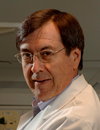Roger Pedersen,
Professor
Professor Roger Pedersen received degrees in biology from Stanford (A.B, 1965) and Yale (Ph.D., 1970) and did postdoctoral work in mammalian embryology at Johns Hopkins. In 1971, he joined the University of California, San Francisco, where he studied developmental potency and fate in mammalian embryos. He moved in 2001 to the University of Cambridge, where he continued his research on human embryonic stem cells as Professor of Regenerative Medicine. The Cambridge Wellcome Trust-Medical Research Council Cambridge Stem Cell Institute (www.stemcells.cam.ac.uk), which he co-founded, is now one of the world’s leading stem cell research centres. Prof Pedersen serves on numerous editorial boards and is a fellow of the Royal Society of Biology and of Churchill College, Cambridge. During the past 16 years Prof Pedersen’s Cambridge lab made huge strides in understanding the cytokine signalling pathways involved in maintaining human embryonic stem cell pluripotency and inducing their differentiation. More recently, his lab focused on differentiation of human pluripotent stem cells (hPSCs) into mesodermal cell types with potential applications in drug discovery, toxicity testing and cell-based therapies. This culminated in functional studies of hPSCs transplanted into gastrula stage mouse embryos to validate their developmental capacity in an organized tissue context. These findings are important because they provide compelling evidence for the functional potential of human pluripotent stem cells, both for modelling human gastrulation and for regenerative medicine.
|

|
|
